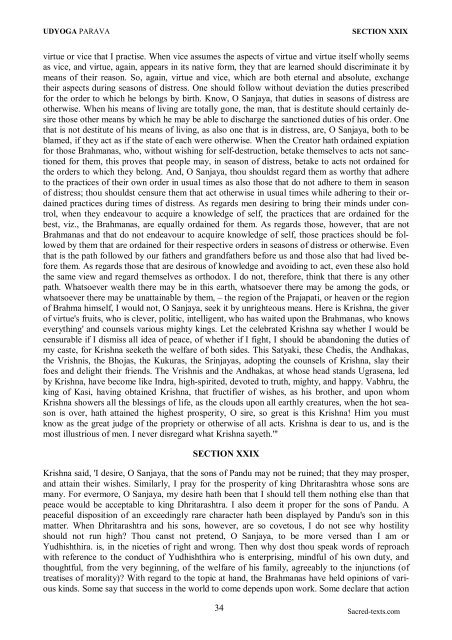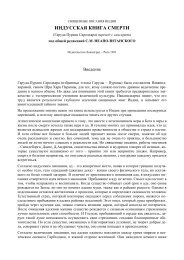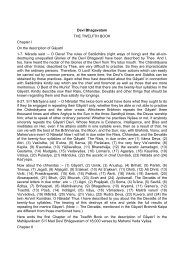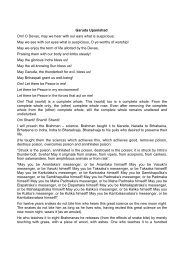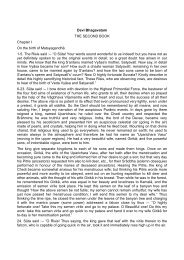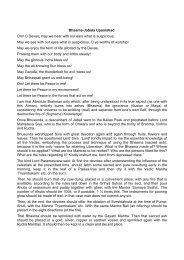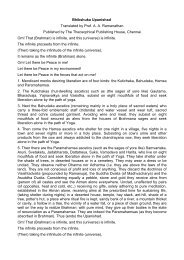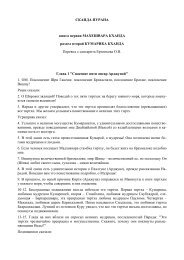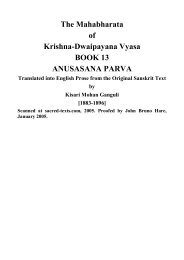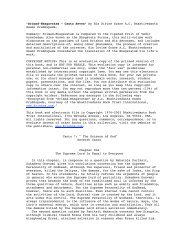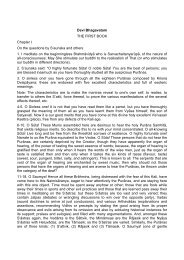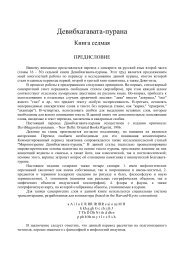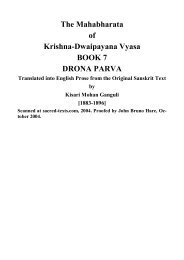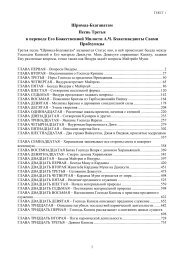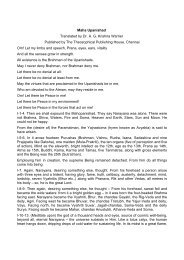Mahabharata 05 (eng)..
Mahabharata 05 (eng)..
Mahabharata 05 (eng)..
You also want an ePaper? Increase the reach of your titles
YUMPU automatically turns print PDFs into web optimized ePapers that Google loves.
UDYOGA PARAVA<br />
SECTION XXIX<br />
virtue or vice that I practise. When vice assumes the aspects of virtue and virtue itself wholly seems<br />
as vice, and virtue, again, appears in its native form, they that are learned should discriminate it by<br />
means of their reason. So, again, virtue and vice, which are both eternal and absolute, exchange<br />
their aspects during seasons of distress. One should follow without deviation the duties prescribed<br />
for the order to which he belongs by birth. Know, O Sanjaya, that duties in seasons of distress are<br />
otherwise. When his means of living are totally gone, the man, that is destitute should certainly desire<br />
those other means by which he may be able to discharge the sanctioned duties of his order. One<br />
that is not destitute of his means of living, as also one that is in distress, are, O Sanjaya, both to be<br />
blamed, if they act as if the state of each were otherwise. When the Creator hath ordained expiation<br />
for those Brahmanas, who, without wishing for self-destruction, betake themselves to acts not sanctioned<br />
for them, this proves that people may, in season of distress, betake to acts not ordained for<br />
the orders to which they belong. And, O Sanjaya, thou shouldst regard them as worthy that adhere<br />
to the practices of their own order in usual times as also those that do not adhere to them in season<br />
of distress; thou shouldst censure them that act otherwise in usual times while adhering to their ordained<br />
practices during times of distress. As regards men desiring to bring their minds under control,<br />
when they endeavour to acquire a knowledge of self, the practices that are ordained for the<br />
best, viz., the Brahmanas, are equally ordained for them. As regards those, however, that are not<br />
Brahmanas and that do not endeavour to acquire knowledge of self, those practices should be followed<br />
by them that are ordained for their respective orders in seasons of distress or otherwise. Even<br />
that is the path followed by our fathers and grandfathers before us and those also that had lived before<br />
them. As regards those that are desirous of knowledge and avoiding to act, even these also hold<br />
the same view and regard themselves as orthodox. I do not, therefore, think that there is any other<br />
path. Whatsoever wealth there may be in this earth, whatsoever there may be among the gods, or<br />
whatsoever there may be unattainable by them, – the region of the Prajapati, or heaven or the region<br />
of Brahma himself, I would not, O Sanjaya, seek it by unrighteous means. Here is Krishna, the giver<br />
of virtue's fruits, who is clever, politic, intelligent, who has waited upon the Brahmanas, who knows<br />
everything' and counsels various mighty kings. Let the celebrated Krishna say whether I would be<br />
censurable if I dismiss all idea of peace, of whether if I fight, I should be abandoning the duties of<br />
my caste, for Krishna seeketh the welfare of both sides. This Satyaki, these Chedis, the Andhakas,<br />
the Vrishnis, the Bhojas, the Kukuras, the Srinjayas, adopting the counsels of Krishna, slay their<br />
foes and delight their friends. The Vrishnis and the Andhakas, at whose head stands Ugrasena, led<br />
by Krishna, have become like Indra, high-spirited, devoted to truth, mighty, and happy. Vabhru, the<br />
king of Kasi, having obtained Krishna, that fructifier of wishes, as his brother, and upon whom<br />
Krishna showers all the blessings of life, as the clouds upon all earthly creatures, when the hot season<br />
is over, hath attained the highest prosperity, O sire, so great is this Krishna! Him you must<br />
know as the great judge of the propriety or otherwise of all acts. Krishna is dear to us, and is the<br />
most illustrious of men. I never disregard what Krishna sayeth.'"<br />
SECTION XXIX<br />
Krishna said, 'I desire, O Sanjaya, that the sons of Pandu may not be ruined; that they may prosper,<br />
and attain their wishes. Similarly, I pray for the prosperity of king Dhritarashtra whose sons are<br />
many. For evermore, O Sanjaya, my desire hath been that I should tell them nothing else than that<br />
peace would be acceptable to king Dhritarashtra. I also deem it proper for the sons of Pandu. A<br />
peaceful disposition of an exceedingly rare character hath been displayed by Pandu's son in this<br />
matter. When Dhritarashtra and his sons, however, are so covetous, I do not see why hostility<br />
should not run high? Thou canst not pretend, O Sanjaya, to be more versed than I am or<br />
Yudhishthira. is, in the niceties of right and wrong. Then why dost thou speak words of reproach<br />
with reference to the conduct of Yudhishthira who is enterprising, mindful of his own duty, and<br />
thoughtful, from the very beginning, of the welfare of his family, agreeably to the injunctions (of<br />
treatises of morality)? With regard to the topic at hand, the Brahmanas have held opinions of various<br />
kinds. Some say that success in the world to come depends upon work. Some declare that action<br />
34 Sacred-texts.com


